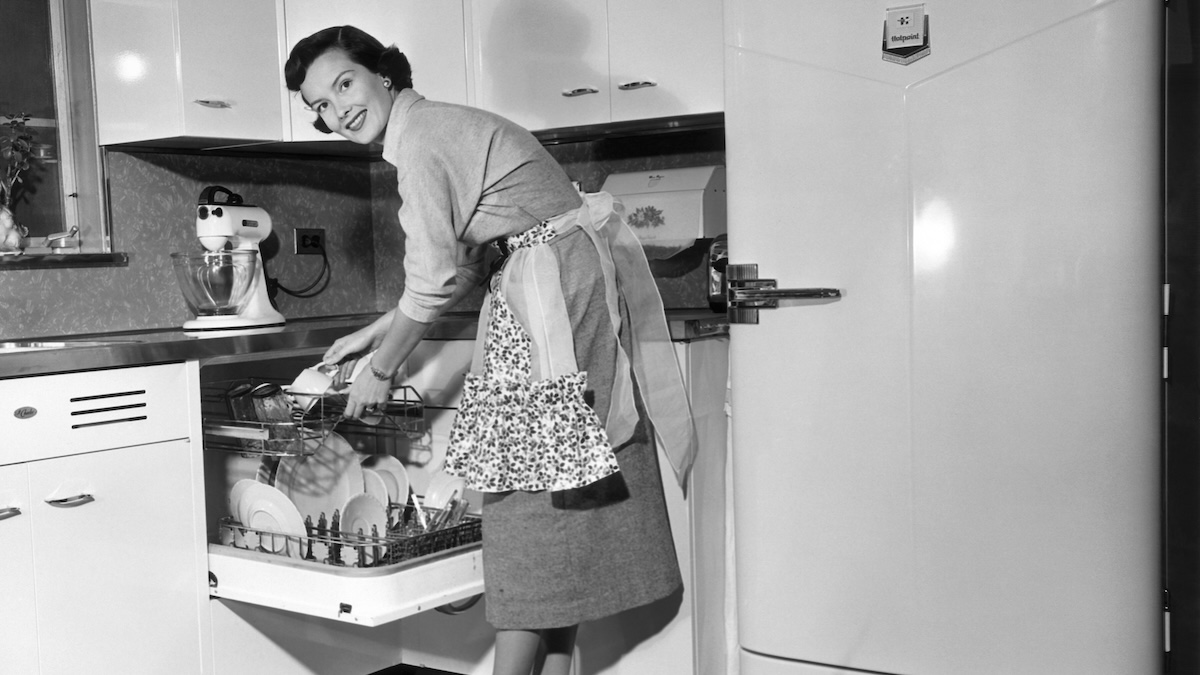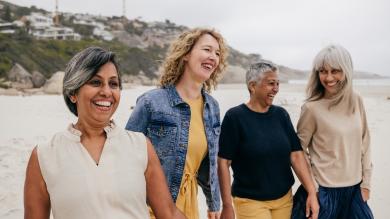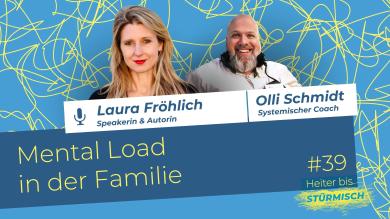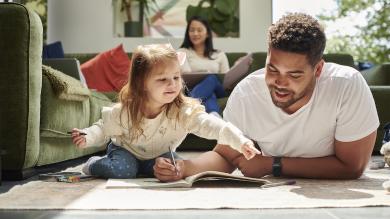
"Tradwife" trend: the new autonomy for women?
Cleaning, cooking, baking, lovingly caring for children and husband. Young women present themselves on social media as traditional housewives. The so-called "tradwives" have deliberately opted for this role model. Is this autonomy in practice - and does life as a housewife even make them happier in the long term than equal partnerships or a single life?
On TikTok and Instagram, young women are celebrating life as a loving and caring housewife under the hashtag #Tradwife. Tradwife is a combination of "tradition" and "wife". Wearing floral vintage dresses, smiling housewives with babies in their arms bake sourdough bread and cakes contentedly - all with dedication and "feminine energy". They forgo their professional careers and devote themselves entirely to family life and the well-being of their husbands.
"If my husband is happy, then so am I!". This sentence seems to be one of the most popular among tradwives and is reminiscent of the advertising image of women from the 1950s. Women from the USA in particular live this nostalgic ideal: being a housewife as a lifestyle statement, against the excessive demands of the modern working world.
The Tradwives seem to be extremely happy. Because they have chosen the role of the "traditional housewife" themselves and live it with full conviction. They emphasize that every woman should do what makes her happy.
Doing what makes you happy sounds self-determined. Nevertheless, the Tradwives movement touches on a central question of modern relationships: How free are our life models really - and which relationship model makes us happier in the long term?
Psychology of choice: Autonomy as the key to satisfaction?
Psychology provides a clear answer to this: satisfaction and mental health do not arise from a specific role model, but from the feeling of having made one's own choices. Self-determination theory is the key concept here. It describes three basic psychological needs. Autonomy is one of them - along with social integration and competence.
Those who experience their role as self-determined are therefore usually happier - regardless of whether they are a full-time mother, career woman or single. If, on the other hand, we perceive our role as being imposed from the outside, our well-being drops significantly. In short: autonomy beats ideology.
"The idea of autonomy is very prevalent these days. We want to realize ourselves and not make our happiness solely dependent on our romantic partner. Rather, we want to have our partner with us in our lives to complement our happiness."
Carline Krügl, systemic coach specializing in sexuality & love, pme Familienservice
So anyone who freely chooses life as a mother and housewife is happy. But what about singles? How are those who are not in a relationship?
Singles between freedom and expectation
A 12-country study (2024/25) shows that singles report a slightly lower level of life satisfaction on average than people in a partnership. However, the principle of autonomy also applies here: those who freely choose their single status experience a similarly high level of satisfaction as people in stable partnerships. In Germany, according to cohort data, the satisfaction of young singles even increases - especially when financial security and social integration are provided.
And what does it look like in partnerships that live an equal model?
Traditional or egalitarian? Those who tick similarly have fewer conflicts
A large US-DE study (PNAS Nexus, 2024) shows that couples are happiest when they share similar values on gender roles - whether traditional or egalitarian. Two long-term studies with over 7,000 couples from the USA and Germany investigated how different ideas of gender roles influence satisfaction in heterosexual relationships.
The result: the decisive factor is how much the partners' attitudes differ - and in which direction. Couples were more satisfied if men thought more equally than their partners or if women had more traditional views than their husbands.
It also showed that the most harmonious relationships were those in which both partners thought similarly - regardless of whether both were very egalitarian or very traditional. It was more difficult when one of the two was more "in between".
So what counts in relationships is balance - not rigid gender models. Nevertheless, this traditional ideal is apparently experiencing a revival - in the movement of tradwives, who are reviving the old one-earner model.
Life as a tradwife - luxury, staging, illusion
And the tradwives are also accused of this: that the movement glorifies an image of the family that has long since ceased to fit the reality of most people's lives. Behind the romantic façade of aprons and idyllic homes lies a model that pushes women into economic dependency and revives the old ideal of the heterosexual one-earner family.
Who can even afford it? Life as a tradwife is a luxury that only couples in which the man earns enough to support the family alone can afford. For the majority of households, this is an illusion: according to the Federal Statistical Office, around 69% of mothers of underage children were working in 2022 - not out of rebellion, but out of financial necessity.
"What really strikes me in counseling is that very traditional roles are often still lived, especially among higher earners."
Carline Krügl, systemic coach, pme Familienservice
What's more, some of the social media tradwives earn a lot of money by entering into deals with companies - so giving up their careers isn't entirely true after all. In the ZDF documentary "Tradwives - demure, pretty, perfect", influencer Alexia Delarosa claims to earn up to 18,000 dollars a month from social media deals.
In these cases, sacrificing one's own career is only part of the staging - real financial independence remains possible, but only for very few.
The topic of mental load is also rarely mentioned in the scene. Mental load describes the constant thinking, planning and coordination of family and household tasks - from shopping to school appointments and bills. Studies from the USA (JAMA Internal Medicine, 2025) document a sharp decline in the mental health of mothers between 2016 and 2023, triggered by care load, economic pressure and social comparison dynamics. German data show the same trend - especially when care work is distributed one-sidedly.
If you want to know how to break the mental load cycle, read this article: Mental Load - The raging in my head
Tradwife: no more autonomy after all?
At first glance, tradwives appear self-determined: they voluntarily forego a career and seem to consciously live traditional values. But real freedom means choice - and that is precisely what is often lacking.
If you are completely financially dependent on your partner, you can hardly be truly self-determined. Behind the apparent self-empowerment often lies the old power model in a new guise, prettily packaged as a lifestyle. Even the social media stars of the scene show it: Autonomy is staged here, but is by no means a given.
Free choice also means: I am covered!
Financial security and fair participation in decision-making are therefore fundamental prerequisites for equality and mutual respect in a relationship.
Anyone living in a traditional family model should therefore make sure that
1. financial decisions are made jointly, whereby open communication is crucial. Often, many men still take on the main responsibility as the sole breadwinner. A fair division of finances is important. Draw up a budget that clearly breaks down income and expenditure.
2. you can also save for your financial goals as a housewife. A 3-account model is a good way to maintain financial independence. Each partner has their own account, and there is a joint account for all joint expenses such as rent and food.
3. retirement provision is planned jointly in order to balance out financial inequalities and ensure that both partners are adequately covered in old age.
Find out how to communicate openly and what fair financial models are available for couples: How to achieve fair financial planning as a couple
Tradwife life: more hype than trend?
In Germany, the trend towards the tradwife remains more of an aesthetic phenomenon than a lived reality. According to a recent study by the Federal Institute for Population Research (BiB, 2025)[1], more than 60 percent of women aged between 20 and 30 have clearly egalitarian role models. Gender therefore plays no role when it comes to the distribution of tasks.
Only just under a fifth (18.5 percent) of the 2,709 women surveyed hold similar attitudes to the influencers, who idealize a traditional role model of femininity, motherhood and care work.
So in the end, it's not lifestyle that determines happiness and mental health, but a simple question: Are you living a model that you really want - or because you think you have to?





.png/d52d81a4-5c52-c715-72f7-cc695251ddd9/d52d81a4-5c52-c715-72f7-cc695251ddd9?imageThumbnail=2)



.jpg/b042e587-4326-5657-87e6-23f69c82b7bd/b042e587-4326-5657-87e6-23f69c82b7bd?imageThumbnail=2)
